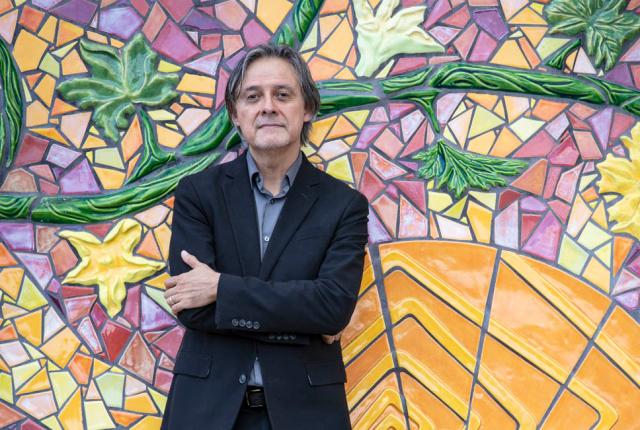New Mexico's state historian, Rob Martínez. Photograph by Jen Judge.
DURING NORMAL TIMES, I’d have already heard Rob Martínez perform live at Corrales Bistro Brewery or another of the many venues he plays statewide. Guitar in hand, he’d sing the Beatles, Bob Dylan, or some traditional corridos, inditas, and alabados, spinning tales about the lyrics, the artist, or the day.
For New Mexico’s state historian, music is more than just music. He grew up in a talented musical family (his father, Roberto, was a founder of Los Reyes de Albuquerque) and learned to be proud of his Mexican heritage. But all kinds of music filled their household, and he absorbed every note. “Our culture is continually evolving,” he says during our interview for “Originals." “We are living cultures.”
So when he plays Elvis, Chuck Berry, or Little Richard (“American folk music,” he calls it) or Cleofes Vigil’s “Himno del Pueblo,” with its Native chanting and rock vibe, it’s fun and energetic. But it’s also a reminder to his audiences—culture with every chord. “This is your heritage, don’t forget it,” he says.
The same can be said for Martínez’s terrific New Mexico History in 10 Minutes, a YouTube series born in the pandemic that covers topics from Mesoamerican influences to the role of the French. “These are very challenging times,” he says. “Now more than ever, we need to study and learn from history.”
Like the strings of his acoustic guitar, history and culture are tangible for Martínez—things that resonate in our language, flavor our food, and shape who we are. “They’re not just things that happened 500 years ago or 100 years ago,” he says.
While so much is new for me, the richness and complexity of nuevomexicano history and culture has been especially energizing. You can feel it throughout this issue, whether it’s Jude Candelaria and his Flux Tufa Works gallery, in Gallup, the research into ancient peoples at White Sands, the success young Native runners have found through Wings of America, or the work of Poet Laureate Levi Romero giving voice to la gente.
I keep thinking about something Martínez told me: “When you’re in contact with other cultures, it doesn’t just change the other culture. It changes you.” And while change is rarely easy, it’s something we should strive for and hold dear.


